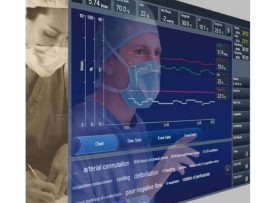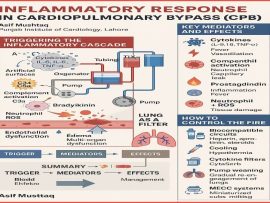Preparing the Child lung for transplant into the Adult patient with usage of EVLPD or Ex Vivo Lung Perfusion Device a practical application which every Perfusionist should be familiar with...
Read MoreThe echo lady; Lorena De Vanna, is a cardiac and respiratory physiologist graduated from the Central University of Venezuela. She currently holds British Society of Echocardiography accreditation..
Read MoreAbstract BACKGROUND: Critically ill patients who receive circulatory or respiratory assist using extracorporeal membrane oxygenation (ECMO) may develop hemolysis, which can complicate the delivery of supportive care and be a..
Read MoreAbstract Background This study aimed to systematically search for relevant evidence on the management of kinesiophobia in patients after cardiac surgery both home and abroad. The evidence was evaluated and..
Read MoreAbstract Background The use of venoarterial extracorporeal membrane oxygenation (VA-ECMO) as a cardiocirculatory support has tremendously increased in critically ill patients. Although fluid therapy is an essential component of the..
Read MoreAbstract Objectives To identify differences in the reported vasoplegia incidence, intensive care unit (ICU) length of stay (LOS), and 30-day mortality rates as influenced by different vasoplegia definitions used in..
Read MoreAbstract Patients undergoing liver transplantation infrequently require extracorporeal membrane oxygenation (ECMO) support. However, when ECMO is required in the peritransplant period, several key considerations are required to maximize the efficacy..
Read MoreAbstract OBJECTIVES Differences in inflammatory responses between men and women may contribute to sex disparities in cardiac surgery outcomes. We investigated how sex differences influence systemic inflammatory response syndrome (SIRS)..
Read MoreAbstract Objective To establish a nomogram for predicting the occurrence of postoperative delirium (POD) in patients undergoing cardiac surgery. Materials and methods Data from 5379 patients were retrieved from the..
Read MoreAbstract BACKGROUND: A preservation system, the Organ Care System (OCS; TransMedics) uses normothermic pulsatile perfusion during organ transport for heart transplantation. This system has demonstrated favorable outcomes in hearts recovered..
Read MoreAbstract Every year, more and more adults and children with severe cardiac and/or respiratory failure require connection to extracorporeal circulation (ECC). Despite a life-saving role in emergency settings, the use..
Read MoreAbstract Predictive scoring systems for adult patients receiving extracorporeal membrane oxygenation (ECMO) support for sepsis have not been yet reported. Based on the Chinese Society of ExtraCorporeal Life Support (CSECLS)..
Read MoreAbstract Background The objective of this study was to evaluate mean cerebral blood flow velocity, gaseous microemboli (GME) counts, regional cerebral oxygen saturation (rSO2), and clinical outcomes using multimodality neuromonitoring..
Read MoreIntroduction Cardiopulmonary bypass (CPB) is a cornerstone of modern cardiac surgery, facilitating complex intracardiac procedures by temporarily assuming the function of the heart and lungs. One of the most critical..
Read MoreIntroduction: Cardiac surgery is among the most delicate and high-risk procedures in modern medicine, and the use of cardiopulmonary bypass (CPB) is central to its success. In this complex setting,..
Read MoreIntroduction Cardiopulmonary bypass (CPB) plays a pivotal role in modern cardiac surgery by temporarily assuming the functions of the heart and lungs during complex procedures. However, despite its life-saving capabilities,..
Read MoreIntroduction Cardiopulmonary bypass (CPB) has revolutionized cardiac surgery by temporarily taking over the function of the heart and lungs during complex procedures. Central to this technique is the management of..
Read MoreAbstract: Cardiopulmonary bypass (CPB) induces a multifactorial systemic inflammatory response that significantly contributes to postoperative complications such as acute lung injury, renal dysfunction, and increased morbidity. This response is initiated..
Read MoreIntroduction Cardiopulmonary bypass (CPB) is essential for modern cardiac surgery, allowing complex repairs and reconstructions by diverting blood away from the heart and lungs. However, during this process, the heart's..
Read MoreIntroduction: Cardiopulmonary bypass, a cornerstone of modern cardiac surgery, temporarily diverts blood away from the heart and lungs, allowing for surgical intervention in a controlled environment. During CPB, blood is..
Read MoreIntroduction Myocardial protection during cardiac surgery is a critical determinant of patient outcomes. Traditional cardioplegia techniques primarily aim to arrest the heart, reduce metabolic demand, and preserve myocardial viability (Buckberg,..
Read MoreAbstract Objective(s) This study was designed to assess the relative association between adjunctive fresh frozen plasma (FFP) or adjunctive cryoprecipitate and morbidity and mortality in cardiac surgery patients receiving platelets..
Read MoreAbstract Heart tumours are a diverse group of tumours that may present with symptoms or be discovered incidentally when a patient is being evaluated for a physical or seemingly unrelated..
Read MoreAbstract Surgical handover remains a high-risk process with no gold standard for practice despite 20 years of available guidance. Variability in practice is common, and poorly performed handover poses significant,..
Read MoreAbstract Nosocomial infections are one of the most frequent complications of extracorporeal membrane oxygenation (ECMO) and are associated with increased mortality (). Bloodstream infections present a particular problem because of..
Read MoreAbstract Background: Although technology is rapidly advancing in immersive virtual reality (VR) simulation, there is a paucity of literature to guide its implementation into health professions education, and there are..
Read MoreAbstract Importance Excessive bleeding is a common and prognostically important complication of cardiac surgery. For bleeding related to coagulation factor deficiency, frozen plasma is the most used therapy. Preliminary trials indicate..
Read MoreAbstract Aim Feeling valued is a striking mitigator of burnout yet how to facilitate healthcare workers (HCWs) feeling valued has not been adequately studied. This study discovered factors relating to HCWs..
Read More



























